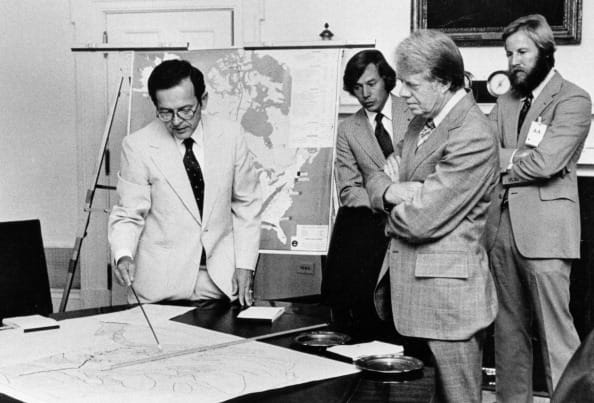In the realm of environmental advocacy, few figures stand out as significantly as former President Jimmy Carter, who, decades before the global community coalesced around the Paris Accords, was already sounding the alarm about climate change. His foresight and commitment to sustainability not only marked a pivotal moment in American environmental policy but also foreshadowed the urgent discussions that would dominate global discourse in the years to come.
Carter’s presidency, from 1977 to 1981, was characterized by a profound awareness of the challenges posed by energy consumption and environmental degradation. In a time when the concept of climate change was not widely recognized or understood, Carter took bold steps to address these pressing issues. His administration’s initiatives were not merely reactive but also proactive, as he sought to educate the public and policymakers about the long-term consequences of unchecked fossil fuel consumption and the importance of renewable energy sources.
One of the most significant moments of Carter’s environmental policy was his famous “Crisis of Confidence” speech delivered in 1979. In this address, he articulated the need for a national energy policy that prioritized conservation and the development of alternative energy sources. He spoke candidly about the implications of America’s reliance on oil, particularly in light of the 1973 oil crisis, which had exposed the vulnerabilities of the U.S. economy and its dependence on foreign oil. Carter’s recognition of the interconnectedness of energy consumption, economic stability, and environmental health was groundbreaking for its time.
Carter’s administration also took concrete steps to promote renewable energy technologies. He championed the use of solar energy, famously installing solar panels on the White House roof, a symbolic gesture that underscored his commitment to sustainable practices. This initiative was part of a broader effort to encourage the adoption of alternative energy sources and reduce greenhouse gas emissions. By promoting solar power and energy conservation measures, Carter aimed to set an example for both the public and private sectors, demonstrating that a transition to cleaner energy was not only possible but necessary.
Furthermore, Carter’s administration established the Department of Energy in 1977, a move that signaled a significant shift in how the federal government approached energy policy. The Department was tasked with addressing the challenges of energy production, consumption, and conservation, and it played a crucial role in advancing research and development in renewable energy technologies. Carter’s foresight in creating this department laid the groundwork for ongoing federal efforts to combat climate change and promote sustainable energy practices.
In addition to domestic initiatives, Carter recognized that climate change was not solely an American issue but a global challenge that required international cooperation. He advocated for the establishment of global frameworks to address environmental concerns, understanding that the actions of one nation could have far-reaching consequences on the planet. This perspective was particularly relevant as the world began to witness the effects of climate change, including rising temperatures, extreme weather events, and shifting ecosystems.
Despite the progress made during his presidency, Carter’s environmental initiatives faced significant political opposition and economic challenges. The energy crisis of the late 1970s led to a backlash against conservation measures, and subsequent administrations shifted focus away from environmental issues. However, the seeds planted by Carter’s advocacy continued to grow, influencing future leaders and movements dedicated to addressing climate change.
As the global community convened for the Paris Accords in 2015, Carter’s early warnings about climate change and the need for collective action echoed in the discussions among world leaders. The Paris Agreement represented a culmination of decades of advocacy, research, and policy development aimed at mitigating the impacts of climate change. It underscored the importance of international collaboration and highlighted the urgency of addressing environmental challenges—a vision that Carter had articulated long before it became a mainstream concern.
In retrospect, Jimmy Carter’s legacy in environmental advocacy serves as a reminder of the critical role that leadership and foresight play in addressing complex global issues. His commitment to sustainability and climate change awareness set a precedent for future policymakers and environmental activists, reinforcing the idea that proactive measures are essential to safeguarding the planet for future generations. As the world continues to grapple with the realities of climate change, Carter’s early advocacy remains a significant chapter in the ongoing narrative of environmental stewardship and responsibility.



